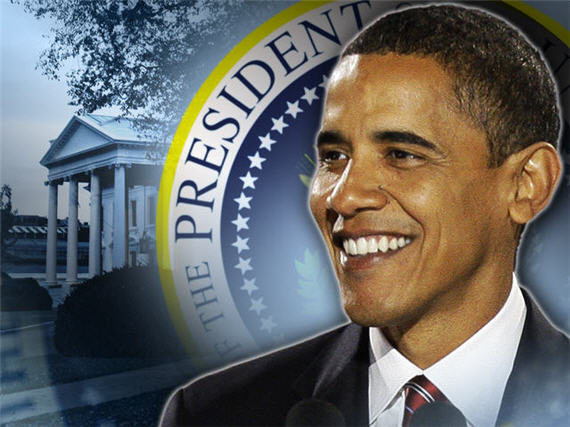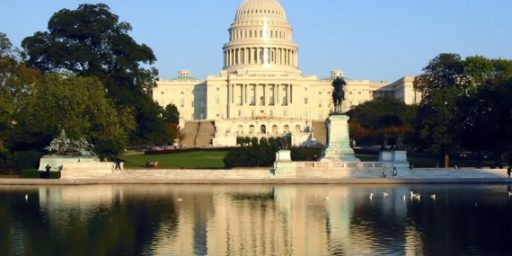In Fiscal Cliff Negotiations, President Obama Holds The Upper Hand
Republicans need to realize that they are at a disadvantage in the upcoming negotiations regarding the Fiscal Cliff.
There are just over six weeks left until the end of the year, and far less than that left in actual legislative time given that Congress will be out of session this week for the Thanksgiving holiday and will likely check out of town sometime around December 21st at the latest. If nothing is done, either in terms of an actual deal or an agreement that kicks the can down the road, then all of the Bush Tax Cuts will expire, the first round of sequestration cuts will begin, the Payroll Tax Cut will expire, and he optimism that Congressional leaders are expressing on the chances of making a deal this year seems more than just a bit optimistic. For one thing, there isn’t a whole heck of a lot of time to craft a comprehensive deal that covers all these areas and satisfies enough interest groups to get a majority in both Houses of Congress. That’s why I still expect that any legislation that does get passed this year will be something that pushes this whole issue off to be dealt with by the 113th Congress. For another, at the moment there is one party to this entire negotiation that holds all the cards and he may be willing to let GOP unwillingness to raise taxes force the country over the fiscal cliff.
I speak, of course, of President Obama. The last time the Bush Tax Cuts were up for renewal in during the 111th Congress’s lame duck session, the President found himself in a politically difficult position. His party had just gotten trounced in the mid-term elections, losing control of the House and cutting back their Senate majority by a significant margin. Moreover, the Republicans had won the mid-terms by campaigning hard against the President’s agenda and his job performance. The economy seemed to be teetering on the verge of slipping back into recession, and analysts were warning that allowing taxes to rise across the board would pretty much guarantee that would happen. The President went into negotiations with the Republicans (the lame duck Democratic leadership was virtually ignored during this process) wanting to renew the Bush Tax Cuts only for people making $250,000/year and less. Because of the political situation, though, he had very little bargaining power and the Republicans were able to force a deal that extended the tax cuts for everyone. Democrats screamed and shouted, but in the end they went along with it because, like the President, they didn’t want to face the prospect of letting the tax cuts expire in a weak economy.
The political landscape is far different today than it was two years ago, however. Most obviously, instead of coming off of a losing election, the President has just been re-elected by an Electoral College margin that was only two states short of the one he won in 2008. Additionally, the Democratic Party picked up seats in both the Senate and the House while several Tea Party icons, notably Joe Walsh and Allen West, saw themselves defeated. Whether it’s true or not, and we’ll never really know, the President can claim that the American people endorsed his view on what should happen to the Bush Tax Cuts by re-electing. Based on polling that goes back all the way to when we dealt with this issue two years ago, it’s certainly true most Americans support raising taxes on “the rich” as part of a deficit reduction deal. What all that means is that, this time around, it’s the President who holds the cards and not the Republicans, and it’s far more likely that the final deal will end up resembling what he has proposed than that we’ll see all of the Bush Tax Cuts extended.
All of this leads to an interesting possibility that Jazz Shaw raises in a post today, the idea that the President may just as soon see the negotiations fail and let the nation go over the fiscal cliff, at least temporarily:
Basically, this works out to a win-win for Obama. Yes, he could look like the great peacemaker and try to strike some sort of grand bargain with Boehner. And if he did, he would likely get some of what he and the Democratic majority want in exchange for taking a slightly less than maximum raise on taxes for the most wealthy. But why?
If he takes a very hard line and forces the showdown to a collapse in discussions, several potentially positive (for him) results are baked into the cake. He can claim that Republicans refused a “balanced approach” and it’s their fault that everyone’s taxes went up. He then has the Democrats force a vote on a bill to only lower taxes on the middle class and the poor and just dares the GOP to vote against it. (They won’t.) At this point he has the tax / revenue increase he promised without giving up a single thing. Now the negotiations start anew to talk about “spending cuts” but the GOP’s major bargaining chip is gone. Obama gets to put up a far more shallow version of cuts, and if the Republicans don’t like it, they can choose to reject the deal and just let the deficit continue to skyrocket.
Politically, it appears that the President would have very little to risk if he did this, and the Republicans would have almost nothing to gain:
The spending cuts are a hangover from the debt-ceiling fiasco of a year ago. Recall from that time of national insanity the patriots threatening to send the United States into default on its debt. Recall their stopping so-called Republican leaders from making a deal that included any new tax revenues. Recall grownups from both parties — terrified of economic disaster in the event of a default — agreeing on the above radical spending cuts, should a better plan not arrive in time.
The Republican Party took the rap for the debt ceiling and is under suspicion for the fiscal cliff. A new Washington Post-Pew Research poll has 53 percent of Americans ready to blame Republicans if America actually goes over the edge and only 29 percent planning to point fingers at President Barack Obama.
Understanding this, thoughtful Republicans are feeling freer to risk the tea partiers’ wrath and cooperate with Democrats. The teams may disagree on much, but at least they’re now playing in the same ballpark.
We’ve seen this before, of course. The President was a far tougher negotiator during the debt ceiling negotiations in the summer of 2011 than he had been the previous December, and it ended up helping him politically largely because the Republicans were hamstrung by a significant part of the House GOP Caucus who foolishly believed that we didn’t need to raise the debt ceiling at all. Adopting the same strategy now would seem to be the politically smart thing for him to do, and if the GOP continues its intransigence on tax increases, it would be very easy for the President to say “No deal,” and walk away. At that point, the GOP would either have to give in, or watch the nation go over the fiscal cliff. Once we hit mid-January and people start noticing that their paychecks are smaller, they’re going to be looking for someone to blame, and you can rest assured that the White House will be telling them that it was the GOP’s refusal to make a deal in December that caused taxes to go up. At that point, I imagine that we’ll see Congress bang out a comprehensive deal that puts tax rates for all but “the rich,” however that’s defined, back to their Bush Tax Cut levels. The Republicans will vote for it in a heartbeat, and Obama will have won.







I agree that Obama has the upper hand in negotiations over, not just the fiscal cliff but the economic direction of America.
But I wonder if any critical thinking Democrats have stopped to ponder what Obama”s plan is? He has said that the Bush Tax Cuts should expire on the top earners and has also talked about additional taxes on the wealthy, but how is this a solution to the fiscal cliff problem? If anything, higher taxes in a recession will just make matters worse. So the key (outside of pro-growth tax policies championed by Republicans) is to cut spending. So what will Obama cut. Sequestration has taken military cuts off the table for the time being. So will he cut entitlements? How? Obamacare is just adding to the personal and business debt in the nation, it does not have any stimulative effect on the economy. So the net of what Obama has done and what we know of his plan is to add to the burden of businesses and rich individuals. Does that sound like a plan to you? He certainly has the upper hand. Question is , what will he do with it?
@Merit Man:
Certainly a valid point, but not one I bet anyone in Washington is thinking about right now. They don’t tend to look past the current crisis.
@Merit Man:
Raising taxes in a recession (we aren’t in, by the way) will make matters worse but cutting government spending won’t? I think you are mistaken.
@Doug Mataconis:
One possible advantage for the GOP. If we go off the cliff they can then vote for a tax cut and say with straight faces that they never voted for a tax increase, thereby hewing to the letter of their Grover Norquist pledges. The fact that they would have caused higher taxes they will attempt to obscure.
I suspect Mr. Obama will negotiate in good faith because I think in four years he’d like to be able to say he left the country with declining deficits. The GOP gives him cover with progressives. Legacy time.
It’s a Hobson’s choice. Raise taxes and thereby harm the economy and snuff out job creation, which in turn further harms the economy and further snuffs out job creation. Or kick the deficit can down the road again, which is like putting a band aid on a hemorrhage. Not a pretty picture. But certainly not surprising. Owing money is a bitch. Relying on the government to solve problems is like relying on asbestos to prevent arson. And when you spend more than you take in it never works out over the long term.
The chattering classes-media-academe cabal is missing the giant flaming screaming neon elephant in the room. Being liberal, spacey and cocooned they see this only as a contest which they want their guy to “win.” The reality, however, is that no matter what happens folks on Main Street are facing very dark days.
We gave the so-called job creators a break on their taxes, and they haven’t really stepped up to the plate and created a whole lot of jobs, have they? George W. Bush had a terrible record for private job creation, despite tax breaks for the wealthy being the cornerstone of his economic plans.
At the levels we are dealing with, tax rates are pretty much irrelevant in job creation. The CBO had a study on it, but the Republicans suppressed publication.
I’m willing to say that decreasing tax rates to create jobs was a fine experiment (it wasn’t, but I’ll pretend), but now we have the answer — it doesn’t work.
@michael reynolds:
If the Reps don’t negotiate in good faith, Obama’s obvious strategy is to let the “Bush tax cuts” expire, and offer a new set of “Obama Tax Cuts” which are better balanced between economic effect and revenue needs, which means temporary extension of payroll taxes, permanent lower rates on lower income ranges, new highest range (maybe over $500,000) with pre-Bush rate, and phased in reform of high end deductions, including some that will affect middle class. All Reps would need to do would be to go along with these tax cuts.
Negotiate sequestration cuts separately. Nobody wants the cuts that are scheduled, and nobody will want the blame for them. Reps might decide they don’t need immediate deficit reduction after all, or maybe they’ll decide to allow Medicare reforms that cut costs for service rather than reducing coverage.
Obama just needs to stay in campaign mode, to make sure that everybody knows what he’s offering.
I have been thinking about all of these proposed solutions to the economy and the “fiscal cliff” problem It seems everyone is talking about raising taxes. It seems that one of the biggest reasons for the economic problems is that businesses can’t hire and rehire until things improve: mainly, people start spending money and buying things again. This requires more money in everyone’s pockets. A tax increase certainly won’t do that and will probably make things worse. A tax cut could give everyone more spending money. People spend, demand for goods picks up, and businesses have to hire and expand. I think this makes more sense than raising taxes. And to help investments, a cut or eliminate the capital gains tax. I heard that President Kennedy lowered taxes during a recession. When the government gets more money, they just find more ways to spend it.
I am making less money than I was a few years ago. I can’t afford to pay more taxes!!
What is Obama’s plan by the way, you know, the one he has so much leverage to push through? And how does it affect deficits, year by year? There is no answer to these questions, of course.
@Merit Man: “[H]igher taxes in a recession will just make matters worse. . . Sequestration has taken military cuts off the table for the time being.”
I don’t mean to be snarky here, but would your conclusion change if you realized you are dead wrong about your premises?
First of all, we are not in a recession. Secondly, there is no evidence that restoring tax rates to their Clinton-era levels will harm the economy. In fact, the economy improved after Clinton raised taxes to the levels Obama is now proposing. Lastly, military spending is absolutely not exempt from the sequestration cuts.
@Whitfield:
The tax increases are only on income above 250,000. If you make 240,000 you pay no extra. If you make 260,000 you pay another 4.6% only on the 10,000 grand overage.
Do you make more than 250k? If not, relax.
The entire debate on “putting our house in order” is missing the point. The number one issue isn’t lowering our deficit. The number one issue is creating jobs.
If we were at 4% or 5% unemployment, tax revenues would dramatically increase thus negating the deficit. We cannot reduce our spending (austerity) to get out of the deficit hole we’re in anymore than we can rely on tax increases to offset it and for the same reason–the more we take money from the economy, the more we stifle growth and job creation.
The short term solution is to borrow more money at historically low interest rates and invest it in rebuilding America’s infrastructure: our electrical grids are obsolete, our roads and bridges are in disrepair, and our government structures and schools can be repaired and upgraded. But that’s not the discussion we are having. We are instead having the same discussion the EU and Great Britain had two years ago and just look at how that’s working out for them. The EU is back in recession.
As unpalatable as it is–as counter intuitive as it seems, we need to spend more money in the short term and consider how we can save money in the out years when the economy is fully recovered and full employment is realized. Having a discussion about austerity now only condemns us to the fate of the EU.
@Whitfield:
Yes, that´s what is needed: an even bigger stock bubble!
That’s some very flawed logic there–that tax increases make a recession worse but cutting government spending makes the economy better…look at the UK to see how “great” austerity is for the economy…
Such utter horseshit…it’s funny that Republicans and conservatives like the fool who wrote the above words weren’t upset at all about government deficits until a Democrat was in the White House…
His plan could involve doing absolutely nothing until after December 31, 2012…then taxes go up and spending goes down…that should thrill someone like you who is so worried about the deficit…of course, at that point, he will have maximum leverage…
Raising taxes in a recession is bad but cutting spending isn’t. Raising taxes on the wealthy is bad, but imposing taxes on those who don’t pay federal income taxes is good. Spending on social welfare programs is bad, but spending on the military is good. We have to slow the cost of medical care, but if the government looks for cost cutting measures in Medicare it’s throwing granny under the bus. We have to do something about Social Security, but increasing the income cap on Social Security taxes is bad. And so it goes.
This isn’t economics, folks, this is class warfare. And that’s why Obama won.
@Andre Kenji: Egg-zactly. I’d prefer that we didn’t treat capital differently than labor. Tax mavens would want us to treat them exactly the same.
(Yes, I’d raise capital gains up to a high level. Impose a Tobin tax on financial transactions. (If nothing else, that would get rid of the HFT stuff that now infests our stock markets like spam.)